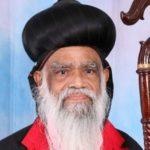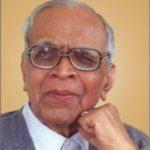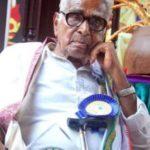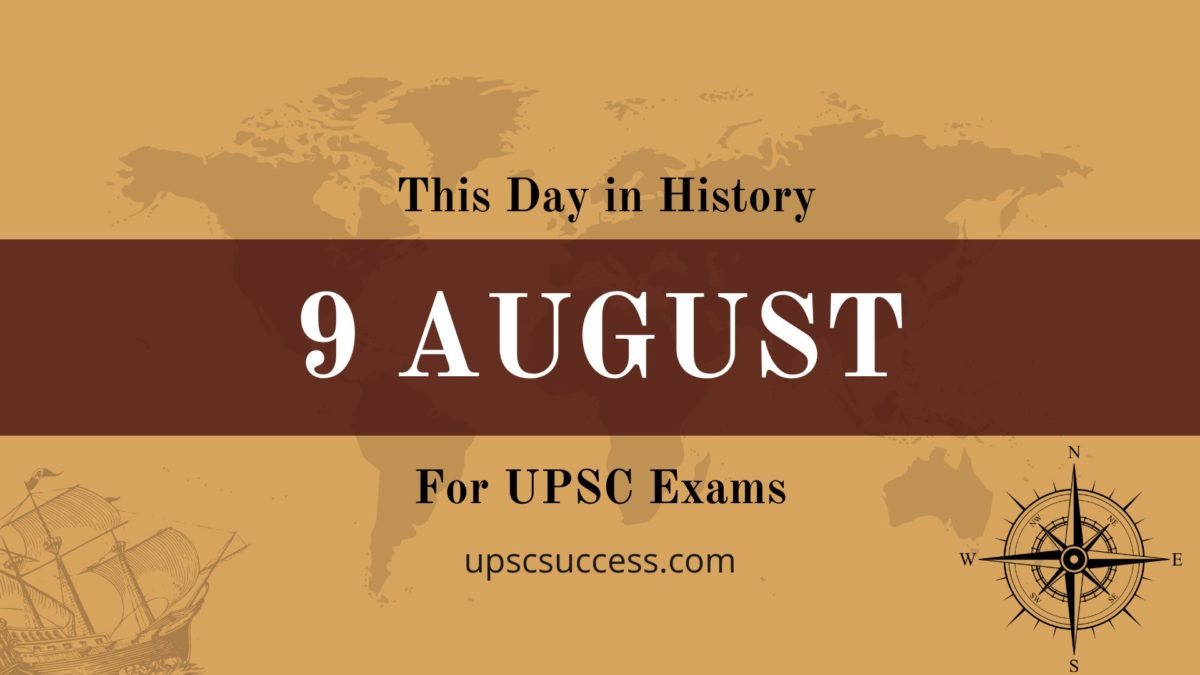Contents
This Day in History on 9 August
The historical events hold a lot of value for aspirants who are sitting for UPSC competitive exams including the IAS Exam.
On this page, we will list all historical events that occurred on 9 August. The students can refer them while preparing for all competitive exams and banking exams.
Important Days
International Day of the World’s Indigenous Peoples: This day is observed on 9 August each year to raise awareness and protect the rights of the world’s indigenous population.
Important Events
1329: Quilon, the first Indian Christian Diocese, is erected by Pope John XXII; the French-born Jordanus is appointed the first Bishop.
1683: By a charter, the British Crown gave the power to the East India Company to declare and make war and peace in Asia.
1788: Ghulam Kadir blinded Delhi Emperor Shah Alam II with his own dagger.
1788: Gulam Kadir removed the eyes of Shah Alam 2nd, King of Delhi with a knife.
1814: Indian Wars: The Creek sign the Treaty of Fort Jackson, giving up huge parts of Alabama and Georgia.
1877: Indian Wars: Battle of the Big Hole: A small band of Nez Percé Indians clash with the United States Army.
1902: King Edward VII has crowned the emperor of Great Britain at Westminster Abbey after the death of his mother Queen Victoria. Earlier, he had held a grand function in which nearly 4,56,000 invitees celebrated this royal feast.
1925: Members of the Hindustan Socialist Republican Association (HSRA) looted the government treasury from the mail train near Kakori, 22 km from Lucknow.
1942: The Congress at its Bombay session passed the famous Quit India resolution, calling for mass struggle on non-violent lines on the widest possible scale, under the leadership of Gandhiji. He stressed that “We shall either free India or die in the attempt; We shall not live to see the perpetuation of our slavery”; popularly known as “Do or Die”. But before the Congress could start the movement, the government arrested all the major leaders and the Congress was declared illegal. Spontaneous popular revolts broke out with the battle cry of ‘British Quit India’.
1942: Mahatma Gandhi after announcing ‘do or die’ slogan alongwith ‘Quit India Movement’ at Bombay was arrested along with 50 others. Gandhiji was interned in Aga Khan Palace at Poona. This Do or Die slogan deep rooted in Indian hearts and resulted in nationwide Quit India Movment. This day is commemorated as “Kranti Day”. Govind Vallabh Pant was send to Ahmednagar Jail, while Sarojini Naidu and many other leaders were also arrested.
1942: Subhash Chandra Bose (Netaji) forms the Indian National Army in Malaya with the help of the Japanese. He inaugurates the Government of Free India at Singapore.
1952: New Delhi reports that 20 mil. Indian peasants were imperiled by crop failures.
1963: India is the first country to add its signature to the test-ban treaty at Moscow.
1965: Pakistan chose to persist while the Indian Army Corps on the ceasefire line got down to neutralizing the Gibraltar Force. As a first step, main infiltration routes were blocked and Pakistan was forced out of the Haji Fir bulge (known to them as Bedori).
1966: Heroes of the 1942 movement were honoured at a rally in Red Fort.
1969: The name of the Ochterlony Monument in Kolkata was changed to Shahid Minar.
1971: India and U.S.S.R signed a twenty-year treaty of peace, friendship and cooperation.
1998: India moves the World Trade Organisation against the European Union reimposing anti-dumping duties on unbleached cotton gray fabric imports.
1999: India’s Manisha Malhotra won the $10,000 ITF women’s circuit tournament at Harrisonburg, Virginia for her maiden tour title.
2000: Parliament approves the Madhya Pradesh Reorganisation Bill 2000, paving the way for the creation of a separate Chhattisgarh State.
Birth/Birth Anniversary
1862: Gangadhar Meher was a renowned Odia poet of the 19th century.
1892: Shri Shiyali Ramamrita Ranganathan, prolific author and first librarian of the University of Madras, was born.
1893: Acharya Shivpujan Sahay was a noted Hindi novelist, editor and prose writer. He was born at Bihar in a middle class family.
1897: E. Krishna Iyer was an Indian lawyer, freedom-fighter, classical artist and activist.

1909: Sayyid Ahmedullah Qadri was a writer, author, critic, editor-in-chief, Indian independence activist, Indian politician and an acclaimed figure of Hyderabad.
1909: Vinayaka Krishna Gokak, famous Kannad poet, play writer, critic of literature, educationist and Gyanpeeth awardee (d. 1992)
1911: Khershed Meherhomji was an Indian cricketer who played as a wicket-keeper.
1923: Alladi Ramakrishnan was an Indian physicist and the founder of the Institute of Mathematical Sciences in Chennai.
1924: Mathews Mar Barnabas, Indian metropolitan (d. 2012)

1935: Om Prakash Kohli, former Governor of Gujarat and a former member of Rajya Sabha.
1936: Saawan Kumar Tak, Indian film director, producer, and lyricist.
1936: Satish Kumar, Indian British activist and editor.
1944: Lorna Cordeiro, Konkani language singer from the coastal state of Goa, India.
1955: Sukhdev Singh Babbar was the leader of Babbar Khalsa International, a Sikh militant organisation whose objective is to create an independent Sikh country Khalistan.
1969: Vivek Mushran, an Indian actor who appeared in the blockbuster Hindi movie Saudagar.

1975: Mahesh Babu, Indian film actor, producer, media personality, and philanthropist known for his works in Telugu cinema.
1980: Suhas Khamkar, a professional bodybuilder from India.
1991: Hansika Motwani, an Indian actress who mainly appears in Tamil films.
1993: Anju Kurian, an Indian film actress who appears mainly in Malayalam films.
1993: Dipa Karmakar, Indian artistic gymnast. Karmakar first gained attention when she won a bronze medal at the 2014 Commonwealth Games in Glasgow.
1993: Pritam Kotal, an Indian professional footballer who plays as a defender for the club ATK and the Indian national team.
Death/ Death Anniversary

1970: Trailokyanath Chakraborty was an Indian independence activist and politician.
1971: Vinodnand Jha, former Chief Minister of Bihar, died.
1992: Sukhdev Singh Babbar was the leader of Babbar Khalsa International, a Sikh militant organisation whose objective is to create an independent Sikh country Khalistan.
2015: Kayyar Kinhanna Rai, Indian journalist, author, and poet (b. 1915)

